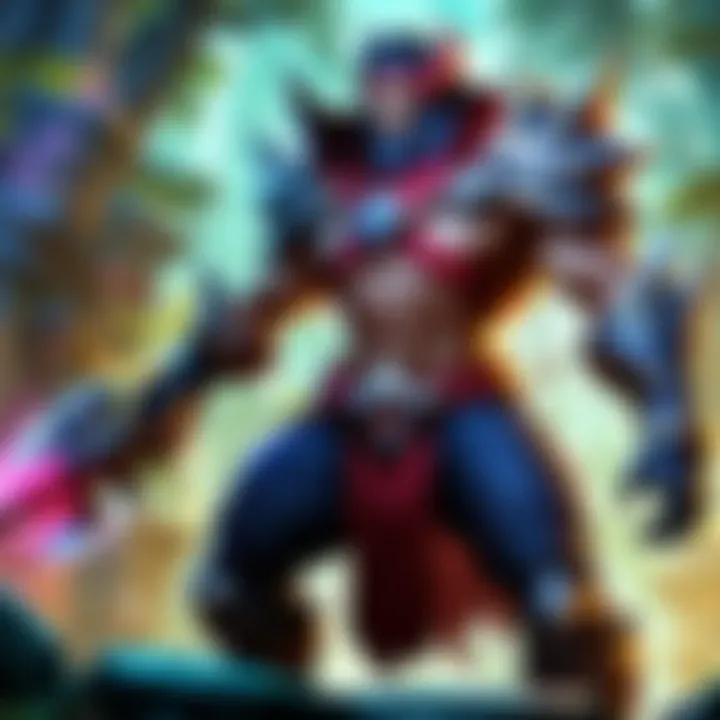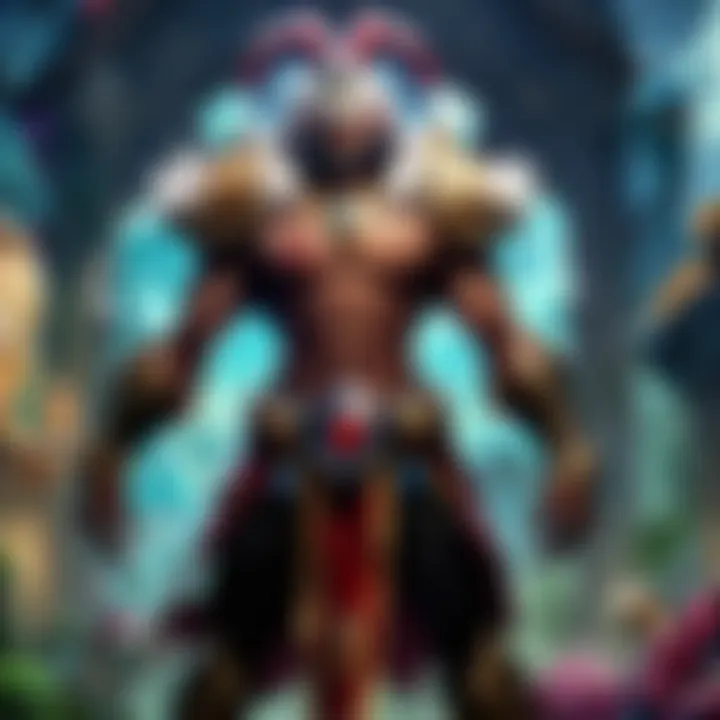League of Legends Assistants: Boosting Gameplay Dynamics


Intro
The world of League of Legends is ever-evolving, an intricate tapestry of strategies, champions, and an engaging community. For many gamers, the challenge isn't simply about mastering a champion or knowing the map; it's about leveraging all available tools to enhance gameplay, and this is where League of Legends assistants come into play.
These assistants act like a comforting hand on your shoulder, guiding players through the myriad of decisions that must be made in this fast-paced environment. From offering insights into champion builds and patch updates, to providing a community pulse check, these tools have quickly become indispensable for both novices and veterans alike. They bring factors like efficiency and strategy right to the forefront, making it easier to navigate the complex landscape of Summoner’s Rift.
In this article, we shall break down the role of these assistants to see just how significantly they influence player performance and overall experience. By highlighting key features, benefits, and some drawbacks, readers will gain a clear perspective on how to maximize their gaming experience through strategic use of these tools.
In the sections that follow, we will explore various facets of League of Legends assistants, from champion spotlights to the latest patch notes, and even some fun community happenings. The relevance of the topic becomes apparent when considering how these assistants can turn what might be a daunting adventure into a well-coordinated mission.
Get ready to discover how much these assistants can reshape the way you engage with League of Legends, making each match not only a challenge but also an opportunity for improvement.
Preamble to League of Legends Assistants
In the fast-paced, ever-evolving world of League of Legends, players are always on the lookout for an edge. Enter League of Legends assistants, tools designed to improve gameplay while enhancing the overall experience. These digital aides serve various functions, making them invaluable not only to seasoned veterans but also to newcomers who may find the intricacies of the game daunting. As gaming technology progresses, understanding the role these assistants play becomes increasingly relevant.
Defining the Concept
League of Legends assistants encompass a variety of tools and applications aimed at aiding players during their gaming experience. Broadly, they range from in-game overlays that provide live data analysis to mobile apps that help strategize before diving into battle. The essence of these assistants lies in their ability to present information in a digestible manner, tailored to what a player needs to know at any given moment. It’s more than just numbers on a screen; it’s about presenting insights and suggestions that can make a critical difference in a match.
A classic example of this is the use of overlays that track statistics of both players and champions. Players can see metrics such as damage done, kills, deaths, and assists in real time, which can inform their decisions. Imagine this scenario: you’re in a heated match and your character’s health bar is dangerously low. Seeing a teammate’s stats on whether they can assist or need help can be an immediate game-changer, allowing players to strategize on the fly. With the right tool, players can gauge not just their performance but also their allies’ and opponents’, leading to more tactical gameplay.
Purpose and Relevance in Modern Gaming
The purpose of League of Legends assistants transcends mere convenience; they enhance strategic depth and foster smarter decisions. Given the complexity of current gameplay dynamics, relying solely on instinct and experience isn’t always enough. Players need actionable insights they can understand quickly. Herein lies the relevance of these tools in modern gaming.
- Aid for All Players: For novices, these assistants provide guidance, helping them navigate their learning curve. For professionals, they refine gameplay by enabling them to analyze opponents or adapt strategies in real-time.
- Enhancing Engagement: In a competitive landscape, where every second matters, having quick access to stats keeps players engaged and responsive. Assistants draw players in by making them feel more informed and capable.
- Community Growth: Moreover, these tools contribute to broader community development. Players who utilize assistants often share their knowledge and learnings, thereby enriching the collective wisdom of the player base.
As gaming continues to interweave with technology, understanding how League of Legends assistants reshape the player experience becomes essential. These assistants not only help optimize individual performance but also foster a sense of collaboration and growth within the entire gaming community.
"In gaming, knowledge is less about having the right moves and more about making the right choices at the right time."
Thus, League of Legends assistants stand as critical components of the current gaming framework, offering both immediate benefits in gameplay and long-term growth opportunities for the community.
Types of League of Legends Assistants
In the ever-evolving realm of League of Legends, assistants have carved out a critical niche. By analyzing the different types of assistants, we can underscore their importance in enhancing the gameplay experience. These tools can cater to a spectrum of player needs, from novice gamers absorbing the basic mechanics of the game to seasoned professionals aiming to fine-tune their strategies. Their functionality not only enriches the gaming experience but directly influences how players engage with the game environment.
In-Game Overlays
In-game overlays serve as a real-time tracking tool, providing players with pertinent information without leaving the game screen. They display critical data like enemy cooldowns, team compositions, and even map objectives right where the action is happening. Imagine being in the heat of battle and suddenly getting a pop-up reminding you of an enemy’s flash cooldown. Insights like these can significantly tilt the scales in favor of a prepared team.
The rise of overlays has offered players an edge in their decision-making. By understanding the current game state clearly, players can strategize on the fly instead of relying on their memory or written notes. This is especially crucial in a dynamic environment like League of Legends.
However, one must tread lightly with these tools. While they can elevate gameplay, excessive reliance on them may lead to players becoming detached from the game's intrinsic strategies—knowing the plays instead of feeling them. Just like any good cook knows their spices, players should learn to blend these tools with their own insights.
Discord Bots and Community Tools
Discord has become a social hub for gamers, and its integration with League of Legends has opened up innovative avenues for interaction and assistance. Bots tailored for League of Legends prowess, such as Mobalytics and LolBot, offer various functionalities, from real-time stats to team recruitment assistance. These tools foster a sense of community by facilitating player interactions, allowing users to share strategies and game experiences.
Furthermore, these bots can relay valuable insights and game stats post-match to help players analyze their performance. This data-driven feedback loop can ignite meaningful discussions among players, pushing them to reflect on their strategies. Yet, it’s essential to strike a balance—while these community tools help foster teamwork and camaraderie, over-reliance may stifle individual growth. After all, nothing beats the learning that comes through personal experience in the game.
Mobile Applications
Mobile applications are reshaping how players engage with League of Legends outside of the main game. Applications like League of Legends: Wild Rift players help them stay updated on champions, items, and meta shifts from anywhere. This level of accessibility is nothing short of revolutionary, catering to the needs of a generation that thrives on instant information.
These applications often offer unique features pull stats, analyze match history, or provide tutorial content. Gamers can use them to bridge the gap between gaming sessions; for example, examining build paths and knowing which champions are in vogue can empower players to come back to the game more informed and ready to adapt.
Yet, as with any technology, moderation is key. Players must be cautious about becoming overly reliant on mobile apps, as they might miss out on the organic experience of learning within the game itself. Adjusting to gameplay in a natural setting often lays the groundwork for true skill development.
Assistants like in-game overlays and Discord bots create a rich assisted gameplay experience, offering valuable insights while encouraging community engagement.
Functionalities Offered by Assistants


When it comes to League of Legends, the need for precision and informed decision-making cannot be overstated. This is where the functionalities offered by assistants become paramount. They not only enhance the gameplay experience but also streamline processes that can often be overwhelming for players. The following sections delve into specific features that these assistants provide, emphasizing their significance and the potential impact on player performance.
Live Game Stats and Analytics
Live game stats and analytics are the backbone of any serious player's toolkit. These features provide real-time data about the game, such as gold income, kill counts, and objective control statistics. Having access to this data can help players identify trends, make split-second decisions, and ultimately adjust their strategy on the fly.
For example, one could keep an eye on the enemy's jungler's movements. Data showing how many camps they've cleared can hint at their next likely move, assisting in avoiding ganks or preparing for objectives. Furthermore, by analyzing one's stats over a few games, a player can highlight consistent weaknesses or strengths in their gameplay.
"Knowledge is power! Using live stats allows players to arm themselves with information that could change the course of a match."
Champion Recommendations
Choosing the right champion can make or break a game. With the multitude of champions available, new players often find it daunting to select one that complements their team composition or counteracts the enemy's choices. Assistants can provide tailored champion recommendations based on various factors, including the player's skill level, their current champion pool, and even the specific objectives of the match.
For instance, suppose a player tends to struggle with securing kills as an ADC. The assistant can suggest champions with strong early game presence, helping the player learn and adapt. This feature significantly decreases decision-making time, allowing players to focus instead on mastering their chosen champion.
Optimal Build Paths
The importance of build paths in League of Legends can’t be overstated. An optimal build path ensures that a champion harnesses their abilities effectively, maximizing both their damage output and survivability. With the constant shifts in meta defined by patches and updates, an assistant can offer real-time recommendations tailored to the specific game situation.
For example, player builds might significantly differ depending on the matchup. An assistant may suggest items that boost armor against a heavy AD team or magical resistance performance if the enemy is casting spells left and right. Understanding and utilizing optimal builds gives players an edge, enabling them to maximize their champion's potential and adapt fluidly to the evolving dynamics of a match.
In summary, these functionalities offered by League of Legends assistants serve to enhance the gameplay experience, providing players with the tools to improve decision-making, strategize better, and elevate their overall performance. Players need to grasp these offerings as they navigate the complex waters of the League of Legends landscape.
Impact on Player Performance
Understanding the impact of League of Legends assistants on player performance is crucial for both casual players and serious competitors. These assistants are not merely tools; they are instrumental in reshaping how players engage with the game. The multifaceted benefits they offer can significantly contribute to overall gameplay efficiency and effectiveness.
Enhancing Decision-Making
In the heat of battle, split-second decisions can make or break the outcome of a match. League of Legends assistants provide players with on-the-fly data analytics that supports informed decision-making. Consider a scenario where a player is deciding whether to engage an enemy champion or retreat. An assistant can analyze real-time game metrics, such as health bars, cooldown timers, and map positions. By presenting this data succinctly, players can weigh their options more logically, reducing the element of guesswork.
Furthermore, these assistants often remind users about important game timings, like when objectives like Baron or Dragon spawn. Such reminders can push players to make proactive decisions rather than merely reactive ones. This capability enhances not just individual performance but can elevate team strategies as a whole, creating a more cohesive approach to gameplay.
Improving Team Coordination
League of Legends is fundamentally a team-based game, and the effectiveness of teamwork can often be the deciding factor in the outcome of a match. Assistants can facilitate better communication among team members by providing shared resources like maps with callouts for enemy positions or incoming threats.
For instance, community-driven tools integrated into Discord can offer real-time alerts based on various game events, which helps players coordinate their movements better. Good communication leads to synchronized attacks or defenses, effectively increasing a team's likelihood of victory. In such cases, even the best individual performances can be heightened when supported by efficient team strategy bred from clear communication.
Reducing Learning Curve for New Players
For newcomers to the game, the complex mechanics and strategies of League of Legends can feel overwhelming. Assistants play a pivotal role in easing this transition by offering guidance personalized to their skill levels. Many tools provide tutorials and overlays that explain game mechanics, champion abilities, and item builds without placing additional stress on the players.
A review of statistics shows that new players who utilize assistants tend to progress faster in skill level compared to those who dive into the game without any support. As they learn the ropes, assistants can offer insights on decision-making and position, which in turn helps reduce the constant barrage of trial and error typically faced.
"The right tool can be the difference between playing a game and truly experiencing it."
Thus, by supporting new players in understanding the game’s intricate details, assistants not only make the experiences smoother but also more engaging, leading to a lower churn rate among the community.
The integration of these functionalities in League of Legends assistants highlights the significance of tools in enhancing player performance, showcasing their essential role in modern gaming.
Critical Analysis of League of Legends Assistants
When diving into the realm of League of Legends assistants, it's essential to take a step back and evaluate their presence with a discerning eye. This critical analysis isn't just for academic banter; it digs deep into the complexities of how these tools fit into the broader gaming ecosystem and their actual impact on player experience.
Understanding the Strengths and Weaknesses
League of Legends assistants, in their various forms, provide players with a multitude of resources that can elevate gameplay. However, like anything in life, the potential advantages come with their fair share of drawbacks that need careful consideration. This analysis sheds light on both sides, helping players make informed decisions on whether the pros outweigh the cons.
Potential Dependency on Tools
As the gaming landscape has evolved, so has the expectation of how players should approach their strategy. With the rise of assistive tools, there's a growing concern regarding potential dependency, where players increasingly rely on these aids for decision-making. This phenomenon can lead to a situation where players, instead of honing their skills and learning from experience, turn to external tools for guidance.
- The benefits of this dependency can include enhanced performance through swift access to data-driven insights. Players can analyze statistics on-the-fly to make real-time decisions that could improve their chances of winning.
- On the flip side, this can lead to diminished game intuition. Players might neglect developing their own skills, relying on automated suggestions instead. It's akin to learning to ride a bike with training wheels—eventually, those training wheels should come off.


Moreover, one can't ignore how this dependency affects various player types. Newcomers might find themselves overly reliant on these tools, struggling to master the fundamental mechanics of the game. Veteran players, conversely, may sometimes dismiss assistants as they believe their personal experience suffices, yet they might still end up using them for competitive advantages.
Effect on Game Integrity
When discussing the implications of League of Legends assistants, the topic of game integrity cannot be overlooked. There is an intricate balance between providing assistance and altering the core experience of the game itself.
Many veteran players, nostalgic for a more straightforward game, express concerns that excessive use of assistants undermines the spirit of competition. They argue that if everyone relies on the same tools, it may dilute the uniqueness of player strategies and creativity.
- Fairness: Is it fair for some players to have access to more robust tools? This raises questions about equality in competitive play. Players who choose to rely on their instincts might feel at a disadvantage against those who are armed with powerful analytical tools.
- Creativity in Gameplay: The widespread use of these assistants may lead to a homogenization of strategies. If everyone is relying on similar recommendations, it’s possible creativity takes a backseat, making plays less distinctive and exciting. Players may begin to mirror popular builds and plays instead of crafting their own unique approach.
"In the end, it's not just about winning; it's about the journey and the skills we build along the way."
Understanding these dynamics can help players make conscious decisions about how they interact with these assistants, ensuring that they contribute positively to the League of Legends experience.
Community Perception of Assistants
Understanding how the community perceives League of Legends assistants is crucial. Players have a variety of perspectives shaped by their experiences and expectations. These tools can enhance gameplay, but they might also stir debate about fairness and skill. Knowing what players think can guide future developments and improve these tools.
In the world of League of Legends, community perception is more than just chatter in forums or on social media. It reflects the collective attitude of players towards the assistants that are meant to aid them. Whether it’s an in-game overlay or a tool that suggests build paths, how players feel about these assistants can influence their usage and the overall gaming experience.
Some players view these tools as essential companions in their gaming journey. They praise them for providing critical insights and statistical breakdowns that complement their tactical decisions. For instance, a player might appreciate a Discord bot that alerts them to optimal champion picks based on their team's composition. Such tools can narrow the gap between novice players and seasoned veterans, allowing everyone to enjoy the game more fully.
However, not all feedback is positive. Some seasoned players voice concerns that these assistants might lead to over-reliance. They argue that constant guidance could dull the instincts and strategical thinking of something that is very core to the game. To these players, part of the thrill of League of Legends lies in mastering the mechanics and developing personal strategies.
Feedback from Players
Player feedback varies widely, and it’s often a mix of commendation and concern. Many gamers express appreciation for how these assistants help streamline their gameplay. Some have shared stories on forums like Reddit, detailing how they improved their win rates and made more informed decisions thanks to live analytics provided by certain tools. They find the performance tracking and champion suggestions invaluable, especially when leaping into a new patch with altered effects.
Conversely, there’s a faction of players who believe there's a slippery slope. They worry that newer players may become too dependent on guidance instead of honing their own skills. Such players often refer to themselves as purists, valuing a more hands-on approach to learning. Their voices resonate within the community, fostering a dialog about the pros and cons of using assistive tools.
Role in Esports
In the realm of esports, the perception of League of Legends assistants takes on a different color. Professional players and teams often embrace these tools, using them to gain a competitive edge. They are not merely a convenience; they are integral to training regimens and pre-match strategies. For instance, coaches utilize data analytics tools to analyze opponents, tailoring game plans based on statistical insights.
Moreover, in the heat of competition, real-time data feed can drastically elevate a team's performance. This leads to a more strategic and thrilling match for both players and audiences. But, it sparks discussions about fairness. Are teams with better access to these tools at an unfair advantage?
In summary, while some players thrive off the insights from assistants, others struggle with the implications of dependence and fairness. The community's diverse views on these aids continue to shape how they are integrated into gameplay both casually and competitively. It will be fascinating to see how this dialogue evolves, especially as advancements in technology and gameplay grow.
Future Developments in League of Legends Assistants
As the world of gaming evolves, so too do the tools that players use to enhance their experience. The realm of League of Legends assistants is no exception. These assistants are continuously adapting to the needs of gamers, aiming to enhance both fun and functionality. Understanding the upcoming developments in this space not only helps players sharpen their skills but also allows them to stay ahead in a competition that is both intense and ever-changing. This section will focus on significant advancements and how they can affect gameplay for the better.
Technological Advancements
Technological progress is the heartbeat of innovation in gaming. In recent years, there’s been a surge in the use of artificial intelligence and machine learning. This tech enables League of Legends assistants to provide real-time feedback and personalized recommendations, adapting based on individual player behavior. For instance, if a player tends to choose certain champions or strategies repeatedly, these tools can now analyze that data and suggest alternatives that align with their unique playstyle.
Moreover, visual enhancements like augmented reality could also come into play. Imagine receiving insights or tactical overlays through a smart lens that dispenses vital information without cluttering the screen. This melding of advanced tech with gaming aids is not just a futuristic notion; it's a soon-to-be reality.
"The right tool at the right time can change a player's path to victory."
The push for greater performance is matched by efforts to improve interface usability. Intuitive designs and streamlined functionalities are paramount in making assistant tools not just available but desirable. Players won’t only want stats; they’ll also desire an interface that feels like an extension of their awareness in-game.
Integration with Game Updates
Noteworthy is the seamless integration of assistants with periodic game updates. As League of Legends continues to evolve with patches and champion reworks, the ability of assistants to quickly adapt to these changes is incredibly valuable. Players benefit greatly when their tools reflect the current meta and provide updated insights on champion strengths, weaknesses, and item builds.
Furthermore, the synchronization of League of Legends assistants with developer updates leads to a more cohesive gaming experience. For example, when a new champion is introduced or when balance patches are rolled out, a well-structured assistant can offer immediate guidance and analysis on how these changes impact strategies.
Ultimately, the role of these assistants is to ensure players feel well-informed and prepared, even in the wake of sweeping changes. This not only empowers individual players but also enriches community interaction, as players share insights on new updates and tactics in forums like Reddit.
In summary, future developments in League of Legends assistants are laying the groundwork for an enriched gameplay experience. With advancements in technology and better integration with game updates, players have the opportunity to elevate their game like never before. Keeping an eye on these trends is essential for anyone serious about excelling in the sport of esports.
Case Studies of Successful Assistant Implementations


Exploring how various League of Legends assistants have been implemented is crucial to understanding their true impact on gameplay. These case studies not only highlight specific tools and their functionalities but also provide insight into real-world applications and the resultant effects on player performance. By examining these implementations, both developers and players can better appreciate the nuances of assistant use and its implications for the entire gaming ecosystem.
Analyzing User Experiences
User experiences are the bedrock of successful implementations of League of Legends assistants. Through feedback gathered from players, developers can better understand what works well and what doesn't. Players typically share their thoughts on how these assistants enhance their gameplay, offering both qualitative and quantitative insights.
For example, a popular in-game overlay tool used by many players is Blitz.gg. Players have reported that it simplifies decision-making during matches by providing live statistics, such as cooldowns and effective health bars. This immediate access to relevant information can be the difference between a daring play or a timely retreat.
Moreover, communities have noted that tools like Mobalytics organize player data, allowing users to analyze their performance over time. This feature fosters a more profound understanding of one's strengths and weaknesses, indicating that personal growth is achievable.
User experiences can be gathered through various platforms:
- Forums: Discussions on platforms like Reddit allow players to voice their success stories and critiques openly.
- Feedback Surveys: Developers often conduct surveys within their tools to gather data directly from users, ensuring that they can continually improve their offerings.
- Streaming Platforms: Players often showcase their gameplay with assistants on Twitch or YouTube, giving insights into how these tools influence their strategies.
Positive user experiences paint a picture of successful assistant implementations as versatile, user-friendly, and genuinely enhancing for gameplay, while negative feedback can pinpoint areas needing improvement, ensuring progress in future iterations.
Comparison Between Different Tools
It's important to recognize that not all League of Legends assistants are created equal; different tools serve varying functionalities and audiences. A benchmark of efficacy can be seen when comparing their offerings, usability, and adaptability.
- Blitz.gg versus Mobalytics: Both are excellent tools, but Blitz.gg emphasizes real-time statistics during matches, while Mobalytics focuses more on post-game analysis and long-term player improvement.
- Porofessor: Another notable contender, this tool integrates smoothly with Discord. It's designed for community play, providing players with valuable insights while also offering role-specific tips.
- Championify: This tool shines in its ability to generate builds tailored to current meta, assessing performance data across thousands of games to suggest optimal items and runes. However, its lack of real-time in-game data may make it less effective during live gameplay compared to tools like Blitz.gg.
- Blitz.gg provides live overlays and quick access to information that helps in the heat of battle.
- Mobalytics features detailed performance analytics that can help players refine their strategies over time.
- In contrast with Mobalytics and Blitz.gg, Porofessor’s community facets allow for an interactive and social experience.
- The Competitive Edge: While some tools emphasize performance analytics, others focus on in-battle utility. This distinction underscores the idea that players must choose tools that complement their playstyle.
Ethical Considerations
Exploring the ethical considerations surrounding League of Legends assistants is like peeling an onion; each layer reveals deeper concerns and various implications. At its core, the ethical discourse grapples with the balance between fair play and assistance, the potential impact on genuine skill development, and the responsibilities of the developers behind these tools.
Fair Play vs. Assistance
Fair play is a foundational concept in any competitive arena, and League of Legends, being a game heavily steeped in competitive spirit, makes this issue particularly pertinent. While assistants serve to provide players with valuable insights and strategies, they also raise the question: at what point does assistance cross into unfair advantage?
- Assistance Tools as Enhancers: Tools like Champion.gg and OP.GG offer stats and build paths that aim to enhance a player's understanding of the game. These platforms can often act as mentors, helping players to improve win rates and gameplay mechanics. Yet, the reliance on these tools could lead to a disengagement from core gameplay strategies that players need to develop independently.
- Skill Degradation: As players increasingly depend on these tools, there is a risk of diminishing their ability to think critically in-game. Instead of developing their strategies, players might inadvertently lean towards a cookie-cutter approach. This can lead to a homogenization of playstyles, which is detrimental to the dynamism and creativity that makes League of Legends so appealing in the first place.
In essence, while these tools can foster a more informed player base, they also threaten to dilute personal skill development. Establishing a balance is crucial; players should harness these tools intelligently, rather than allowing them to do the thinking for them.
The Role of the Developer
Developers play a significant role in shaping the ethical landscape of League of Legends assistants. They are not just creators, but also custodians of the game’s integrity. Their decisions can either promote fair play or inadvertently contribute to ethical dilemmas within the gaming community.
- Guidelines and Standards: Developers need to establish clear guidelines for third-party assistants. These guidelines should ensure that tools do not promote any form of cheating or give players an unlawful advantage. Transparency in how these tools operate can help players make informed choices about what they use, fostering an environment of fair competition.
- Monitoring and Feedback: Continuous monitoring of how these assistants affect gameplay dynamics is another responsibility. Gathering feedback from the community regarding their experiences with these tools can shape future updates and rulesets. Engaging with the player base can help form a united front toward maintaining the integrity of both the game itself and the community surrounding it.
"A strong ethical framework is paramount in keeping the competitive spirit alive. Trust is built when players feel that the game remains fair and challenging."
In summary, the ethical considerations surrounding League of Legends assistants bring to light important discussions about the line between assistance and unfair advantage. As developers and players navigate this intricate landscape, a commitment to maintaining fairness will be essential in preserving the longevity and vibrancy of the game.
Ending: The Future of Gaming Assistants
As the gaming landscape continues to evolve, the significance of assistants for League of Legends becomes ever more pronounced. These tools not only manage to streamline gameplay but also provide players with invaluable insights that can tilt the scales in their favor. This discussion surrounds the idea that the future of these gaming assistants is shaped by both technological advancements and shifting player expectations.
The importance of integrating these tools into gaming scenes lies in their ability to adapt to rapidly changing game environments and community needs. Players aren't just looking for stats; they desire solutions that enhance their overall experience. In this context, gaming assistants are poised to redefine how players approach match strategies, effectiveness, and learning processes.
"These tools stand at the intersection of support and performance, bridging the gap between casual gaming and competitive strategy."
Embracing Change in Gameplay
The gaming community is in a constant state of flux, driven by new content, frequent patches, and an ever-growing player base. In this environment, using assistants isn't merely about having a tool at hand; it's about embracing a vision of gameplay where flexibility and adaptability reign supreme. With each game update, these assistants evolve, integrating new champions, mechanics, and strategies meant to keep players at the top of their game.
Furthermore, there’s a cultural shift in how players approach their roles in the game. No longer are they just solitary figures relying solely on personal skill. Instead, assistants serve to foster a team-oriented mindset, where collective strategy and organizational play become paramount. The future points towards more immersive experiences, where assistants will play a crucial role in ushering in this new age of cooperative gameplay.
Balancing Assistance with Skill Development
While leveling the playing field is certainly a goal, it’s crucial not to lose sight of skill development in the process. This is where the fine line arises – too much reliance on assistants can blunt a player's natural instinct and growth. A thoughtful approach mandates that players engage actively with these tools, using them as guides rather than crutches.
Gaming assistants should promote a culture that encourages mastery of the game’s intricacies, rather than substituting it. For example, using a champion recommendation tool can elevate a player's understanding of match-ups and synergy. It can enhance decisions during a game, yet the ultimate understanding of champion dynamics and gameplay styles remains fundamental to success.
In the end, the role of League of Legends assistants serves as a dual-edged sword; they are pivotal in developing strategic play, yet they can also risk stunting growth if relied upon too heavily. The challenge moving forward lies in striking this balance, ensuring that the thrill of learning and mastering skills is retained even as we embrace technological advancements.







